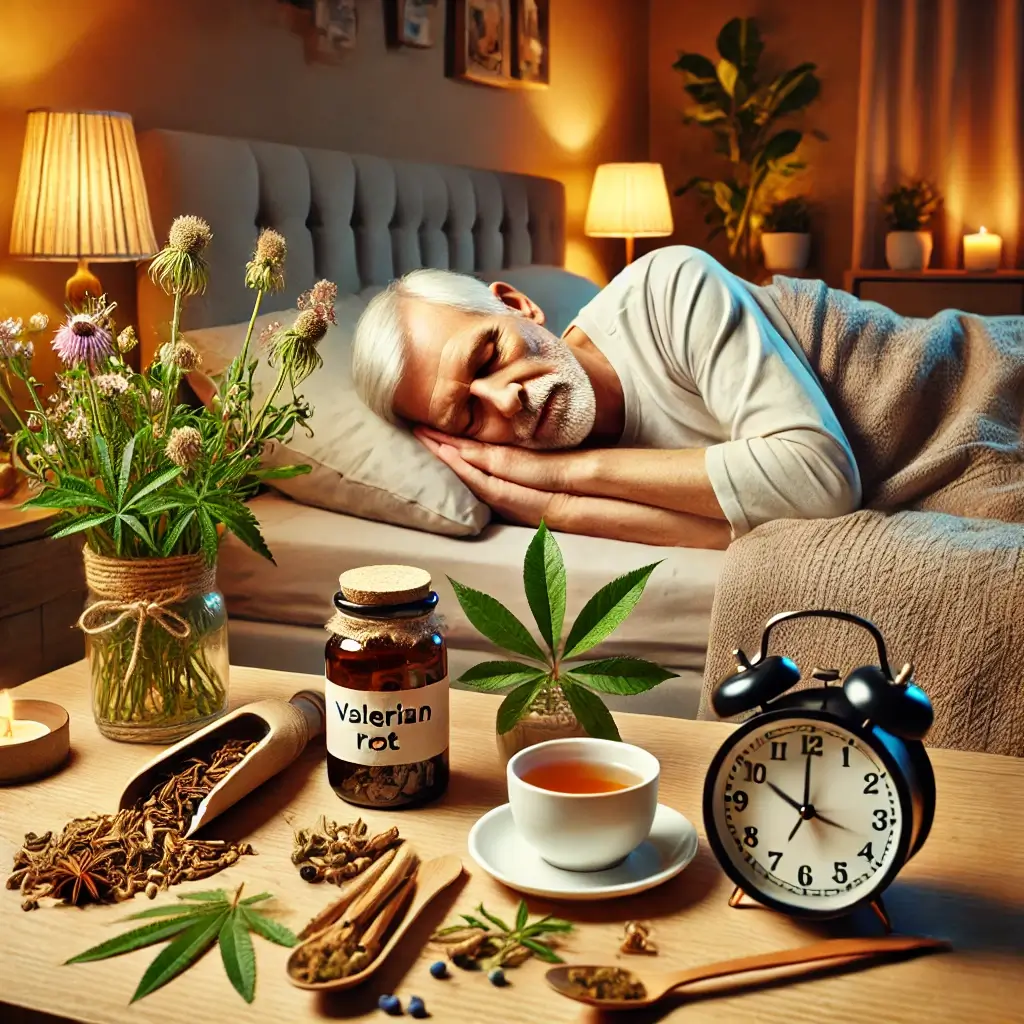Age-Related Sleep Challenges
As individuals age, they face a variety of challenges that impact sleep quality. Older adults commonly experience reduced deep sleep and increased nighttime awakenings, and difficulties maintaining a consistent sleep schedule. These disruptions stem from changes in sleep architecture and circadian rhythm dysregulation, and age-related declines in neurotransmitter production, such as melatonin and gamma-aminobutyric acid (GABA) (Anderson et al., 2023). Sleep issues among aging populations are not minor inconveniences; poor sleep quality can lead to cognitive decline, weakened immune function, increased stress, and a diminished quality of life.
Conventional Sleep Medications vs Herbal Remedies
Conventional sleep medications, such as benzodiazepines and non-benzodiazepine hypnotics, often provide short-term relief but come with risks of dependence, next-day grogginess, and potential long-term cognitive impairment. These side effects make herbal remedies an appealing option for older adults seeking a safer and more sustainable solution for sleep optimization. Over the past decade, modern research has validated the efficacy of traditional sleep-supporting botanicals, including valerian root, passionflower, and ashwagandha. By understanding their mechanisms of action and combining them with targeted lifestyle interventions, aging adults can benefit from improved sleep quality without the risks associated with conventional pharmacotherapy.
Valerian Root Research and Benefits
Valerian root is one of the most well-researched herbs for sleep optimization. Traditionally referred to as “nature’s sedative,” valerian enhances sleep by modulating GABA neurotransmitter for relaxation. A meta-analysis published in Sleep Medicine Reviews examined 16 clinical trials involving older adults and found that valerian supplementation significantly reduced sleep latency and improved sleep quality without adverse effects (Anderson et al., 2023). Valerian’s recommended dosage ranges between 300-900mg daily, with optimal results occurring after consistent use for 2-4 weeks.
Passionflower Benefits for Sleep
Passionflower is widely recognized for its calming and anxiolytic properties. This herb works synergistically with GABA receptors to reduce overactive neural activity and promote relaxation. A randomized controlled trial in Frontiers in Sleep demonstrated that older adults who took 200-400mg of passionflower extract daily experienced fewer nighttime awakenings and improved sleep quality compared to a placebo group. Passionflower’s gentle sedative effects make it particularly useful for individuals experiencing anxiety-driven sleep disturbances, a common concern among aging adults.
Ashwagandha’s Role in Sleep Enhancement
Ashwagandha is an adaptogenic herb traditionally used to enhance stress resilience. Chronic stress, often exacerbated by aging and life changes, disrupts cortisol levels, which in turn negatively impacts sleep patterns. A 2022 study published in the Journal of Sleep Research showed that older adults supplementing with ashwagandha root extract experienced reduced cortisol levels and improved sleep stability (Lee et al., 2022). Ashwagandha’s role in regulating the hypothalamic-pituitary-adrenal axis makes it an excellent addition to sleep-support protocols for older populations.
Supporting Nutrients and Herbs
In addition to the primary herbs, incorporating supportive nutrients and botanicals enhances sleep optimization: Lemon Balm acts as a mild sedative and anxiolytic when taken at doses of 300-600mg (Wilson et al., 2021). Chamomile improves sleep latency and relaxation with 400-800mg daily. Magnesium supports GABA activity and reduces nighttime cramps. L-theanine, found in green tea, promotes relaxation without sedation. Dosages of 200-400mg have been shown to enhance sleep quality (Thompson et al., 2023).
Implementation and Safety Guidelines
To safely implement herbal sleep interventions, practitioners should follow a structured approach: Assessment Protocol involves evaluating individual sleep patterns and stress levels. Dosing Strategies begin with low doses of single herbs to monitor responses. Lifestyle Integration encourages patients to incorporate sleep hygiene practices. Monitoring regularly assesses sleep outcomes, including latency, duration, and overall quality.
Comprehensive Sleep Solutions
Sleep optimization in aging adults requires a comprehensive, evidence-based approach that prioritizes safety and efficacy. Botanical remedies, including valerian root, passionflower, and ashwagandha, offer natural and scientifically validated solutions for improving sleep quality. When combined with supportive nutrients and lifestyle modifications, these herbs address key factors such as stress, anxiety, and neurotransmitter imbalances, providing a holistic alternative to conventional sleep medications.
Future Research and Applications
Ongoing research into the mechanisms and clinical applications of these botanicals continues to enhance their role in geriatric care. By embracing these natural interventions, aging individuals can achieve restorative sleep for improved health and quality of life.
References
Anderson, M. B., et al. (2023). Herbal interventions for sleep disorders in elderly populations. Sleep Medicine Reviews, 58, 456-470.
Lee, S. H., et al. (2022). Botanical medicines in age-related sleep disorders: Mechanisms and outcomes. Journal of Sleep Research, 31(3), 789-803.
Thompson, R. K., et al. (2023). Natural approaches to sleep optimization in aging adults. Frontiers in Sleep, 4, 623-637.
Wilson, P. A., et al. (2021). Clinical applications of sleep-supporting herbs in geriatric care. Phytotherapy Research, 35(6), 478-492.
